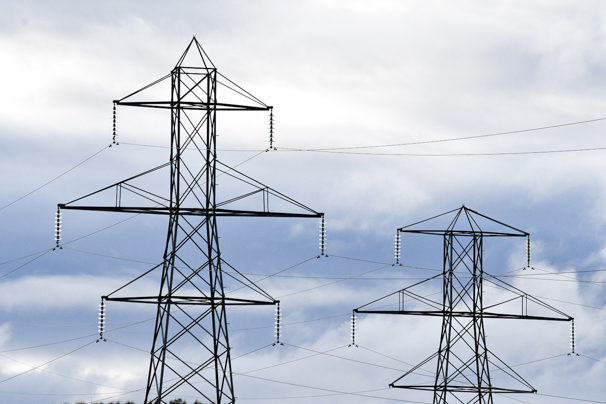Independent MP says dealing with Marinus Link "a lot bigger deal" than AFL stadium

Former Liberal MP turned independent John Tucker wants the $3.8 billion Marinus Link electricity transmission project across Bass Strait reviewed as a project of state significance, a step that would make it subject to a vote by both houses of state parliament.
“Marinus Link, in my eyes, is a lot bigger deal than the stadium - like three or fourfold bigger for Tasmania,” Tucker told Tasmanian Inquirer.
“As [fellow Liberal-turned-independent Lara Alexander] and I have said right from the word go, we need to lock in this project into the project of state significance [process] so that it comes back to parliament.”
Tucker and Alexander quit the Liberal party in mid-May blaming concerns about the direction of the government, particularly a lack of transparency about the proposed AFL stadium at Macquarie Point and major energy projects.
A memorandum of understanding (MOU) between Tasmanian Premier Jeremy Rockliff and the two former Liberal MPs committed the government to designate the stadium as a project of state significance, but did not mention TasNetwork’s Marinus Link project or Hydro Tasmania’s “Battery of the Nation” plan.
Rockliff has agreed to amend legislation to require projects of state significance to be voted on twice by MPs - initially to refer the proposal to the Planning Commission for an inquiry and a final vote after the assessment is completed. The review of the stadium proposal is expected to take about two years.
Tucker said: “The stadium was the hot issue at the time. And so we wanted to get the stadium sorted first and get that through the Project of State Significance process. But the Premier is well aware that I’m saying that with this amendment, that we’ll be covering Marinus Link as well so that it can go through that process.”
Rockliff did not respond to a request for clarification on whether he would designate Marinus Link as a project of state significance.
The Marinus Link proposal comprises two transmission cables to Victoria that are expected to cost about $3 billion, and a transmission development to connect new wind farms in the state’s north west to the grid that is expected to cost about $800m.
“If we’re going to put $2 billion up as a deposit, we’re locking ourselves in.”
John Tucker
If it goes ahead, Hydro Tasmania plans upgrades as part of its Battery of the Nation project - a $750 million redevelopment of the Tarraleah power station to coincide with the commissioning of the first cable, a $1.5 billion pumped hydro storage project at Lake Cethana timed to coincide with the second cable and $300 million for other power station upgrades on the west coast.
Marinus Link Pty Ltd, a subsidiary of TasNetworks, was due to receive the final tender bids for the project by the end of June. Four companies were shortlisted to supply the cable and three to provide the converter stations.
Tucker said he was concerned the Tasmanian energy projects could suffer similar cost overruns to the Snowy Hydro 2.0 project in New South Wales that was announced by then Prime Minister Malcolm Turnbull in 2017. Snowy 2.0 was estimated to cost $2 billion, but is now expected to reach at least $5.9 billion, with some analysts suggesting it could be as much as $10 billion.
Deposit question unanswered
At a June 6 parliamentary estimates committee hearing, Greens MP Rosalie Woodruff asked Energy Minister Guy Barnett whether he could confirm that TasNetworks was required to pay a $2 billion deposit to get on a five-year waiting list for cables.
Barnett replied: “We will only operate and proceed if it is in the best interests of Tasmania.”
After further failed attempts to get an answer, Woodruff said it would be “utterly outrageous” if the state committed $2 billion towards buying a cable prior to a final investment decision on the project in December 2024.
Barnett and TasNetworks did not respond to questions from Tasmanian Inquirer on whether a $2 billion deposit was required before a final investment decision was made on the project. Tucker said he agreed with the concerns raised by the Greens but that he had been reassured by the government.
“They are saying that there isn’t any deposit or anything yet. That’s to be looked at, which I’m pleased about,” he said.
“If we’re going to put $2 billion up as a deposit, we’re locking ourselves in.”
Tucker said that he wanted parliamentarians to have access to more detailed information about the project than had been made available. “I will be looking for all commercial-in-confidence information on Marinus Link to be released to all parliamentarians,” he said.
He said he also wanted the full details of Hydro Tasmania’s October 2022 agreement with APA Group, the new owners of the existing Basslink cable, disclosed to parliamentarians.
The agreement includes a commitment by Hydro Tasmania to continue to pay a facility fee on the Basslink cable until June 30, 2025. An independent economist, John Lawrence, estimated Hydro Tasmania’s annual payment for Basslink at $125 million.
 @BobBurtonoz
@BobBurtonoz